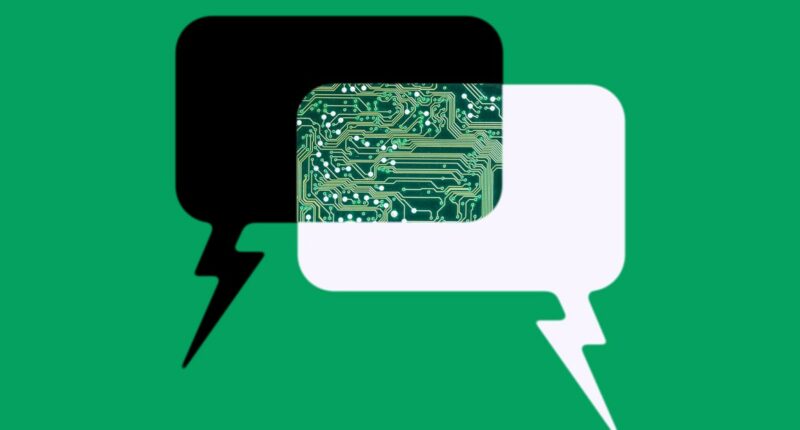Share this @internewscast.com
Can AI help “smooth over” discussion on abortion, racism, immigration, or Israel-Palestine? Columbia University sure hopes so.
The Verge reports that a university has initiated trials for Sway, an AI-driven debate tool still in its beta phase. Created by researchers at Carnegie Mellon University, Sway is designed to pair students with differing opinions for one-on-one discussions on controversial topics, aiming to foster improved dialogue. Nicholas DiBella, a CMU postdoctoral scholar involved in the development, revealed that about 3,000 students from over 30 academic institutions have engaged with Sway.
One of those may soon be Columbia.
The potential collaboration news follows over two years of heightened tensions at Columbia University involving students, administrators, and federal authorities. Columbia has been embroiled in numerous disputes, including expulsions linked to pro-Palestinian protests, police interventions, and federal government challenges.
Sway is being tested at Columbia’s Teachers College to possibly incorporate into conflict resolution teachings and “bridge-building” efforts, as mentioned by DiBella. Columbia’s other departments also show interest in utilizing Sway from fall 2026 onward. Simon Cullen, a CMU assistant professor and Sway’s co-developer, noted discussions with Columbia University Life about the tool.
Sway integrates an “AI Guide” within discussions to challenge student reasoning through probing questions. It also offers rephrasing suggestions for confrontational language. A sample topic demonstrated in Sway’s introductory video debates whether the US should emphasize Palestinian rights over sending arms to Israel.
Columbia did not provide a comment by publication time, even after being granted a request for more time to respond.

‘A pattern that Columbia repeats’
Columbia is undergoing significant transformations due to a $200 million settlement with the Trump administration, aimed at addressing antisemitism. This settlement enables Columbia to reacquire access to $1.3 billion in federal funds. The university must provide extensive data, enforce protest regulations, and enhance oversight of international students. Moreover, Columbia agreed to collaborate on fostering constructive on-campus discussions, with the Sway AI partnership potentially playing a role in this initiative.
This is one of many instances where Columbia appears to be investing heavily to peacefully resolve student conflicts, according to sources from the university speaking with The Verge.
“This is a pattern that Columbia repeats, where our conversations are evacuated of politics and history and context,” the Columbia source, who requested anonymity for fear of retaliation, told The Verge. They added: “Columbia, as a place of scholarship and study, excels at framing the nuance and politics of these issues. What the administration is trying to do is frame these as ‘difficult conversations,’ evacuated of their rooted context, both at the university and globally.”
“It’s pretty much the trustees trying to put out fires in my opinion.”
One place for such conversations is a group called Student Leadership Engagement Initiative (SLEI), billed as a way to facilitate dialogue between students and senior administrators, which had seven meetings last fall and seven last spring. It involves more than 70 students that are hand-picked by deans of students (and paid thousands of dollars each, per the Columbia source) to come together and “explore differences in points of view,” according to the website.
“It’s pretty much the trustees trying to put out fires in my opinion,” the Columbia source said, adding, “[Otherwise], you would never see trustees drop that much money per student to come to meetings to meet with senior administrators … It just seems like they were trying to throw money at it.”
“One of the constants of the last two years at universities like mine has been a crisis response-style approach to political controversy, dissent, and protest,” Joseph Howley, associate professor in Columbia’s Classics department, told The Verge. “What we have are approaches from the world of corporate crisis response, policing, and law enforcement being directed at disagreement and dissent as if they are problems to be solved rather than fundamental values to be cherished.”
‘Looking for magic bullets’
Sway’s Cullen has said publicly that the tool is tied to the US intelligence community when it comes to part of its funding and research. Sway also received recent funding from the Arthur Vining Davis Foundations, the Snyder Foundation, the Omidyar Network, the Tools Competition, and Carnegie Mellon University itself, DiBella said.
DiBella said that Sway will share anonymized data with the public and the intelligence community, but not transcripts or specifics. “All the data that we share is public, so there’s not any specific data-sharing pipeline with the intelligence community,” he said.
The reason for the intelligence community’s involvement is that they fund DiBella’s own postdoctoral work, he said. They “have a bunch of these postdocs that they fund each year to carry out basic scientific research that might be of interest to the intelligence community,” DiBella said. “They fund basic research that could be of interest to them, but it’s entirely unclassified, unconfidential research and there’s no specific data that’s shared with them.”
He also said that though the company does not share student transcripts nor answers with instructors, it does share with them each student’s score on a five-question “understanding quiz” they take after participating in a discussion, which gauges how well they understood the logic of the discussion.
When asked about Sway, the Columbia source said, “I don’t trust Sway would approach this with any understanding of international politics, of power, and it would just be about making people feel better. That really frustrates me, as it’s a common move at Columbia.”
In Sway’s early empirical studies, the team tested users on the topic of whether the 2020 election was “stolen.” But debates like this spur the question: Is it really productive for dialogue, in cases where one side is proven to be wrong, to merge closer together or to “sway” one person closer to a view based on misinformation? In which cases is moderation between two opinions decidedly not good — and who decides that?
“We are in a political moment where everyone is looking for magic bullets.”
Sway’s “understanding quiz” measures success based on a rotation of survey questions given to students in groups of about five questions. They include whether the student found the discussion valuable, whether they now had a better opinion of someone on the opposing side, whether they think the arguments presented by the other side are better than they did before the discussion, and, crucially, whether the discussion caused them to change their mind about the topic of discussion.
“Close to 50 percent actually say they changed their mind about something in the discussion,” DiBella told The Verge. Though he said that alone isn’t a measure of success because “it might be that they changed their mind in the direction of falsity rather than the direction of truth.” Ultimately, he said the Sway team isn’t trying to get students to change their opinions but is looking to get them to be open to arguments from the other side, with less hate involved.
“After having these discussions, students do become less confident in their own views,” he said, adding, “They’re getting closer to each other. They’re becoming more malleable. That’s actually why we used the word ‘sway’ … We want their opinions to be more malleable to allow for the capability of changing your mind.”
The potential Sway partnership is not the only way Columbia is reportedly using tech to screen or shape students’ convictions. The university is also reportedly using Schoolhouse Dialogues, a tool offered by Sal Khan of Khan Academy’s nonprofit, to pair high school students with opposite viewpoints on controversial topics, then rank each other’s “civility” — and Columbia could use that feedback in its admissions decisions.
To Howley, who has also taught a course on AI labor and knowledge work, there’s an influx of groupthink about “the magical promise of AI” that university leadership isn’t immune to.
“Some of the people at the very top, who … do not do the work of knowledge, creation, or education, have convinced themselves that this kind of software is a magic bullet, and we are in a political moment where everyone is looking for magic bullets,” he said. “It all just couldn’t be more disconnected from what I think of as — sorry to sound hyperbolic — the sacred charge of a university.”
0 Comments









